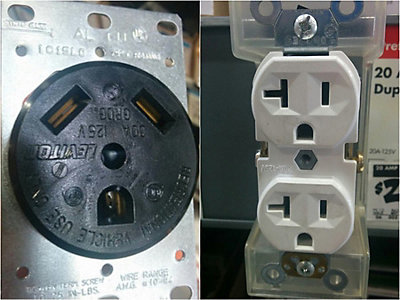How Much Does It Cost to Install a New Electrical Circuit in Denver?
The cost of installing a new electrical circuit in a Denver home can vary depending on several factors. This blog post will explore these factors to help you understand the overall project cost, including:
- The amperage of the circuit
- Whether the circuit needs GFCI/AFCI protection
- The circuit length
- The level of accessibility
- The electrician you hire
Let’s take a closer look at these 5 price factors.
Cost factor #1: The amperage of the circuit
First off, “amperage” refers to the amount of electrical energy flowing through your circuit.
Residential circuits are typically 1 of 4 sizes:
- 15-amps
- 20-amps
- 30-amps
- 50-amps
Typically, the larger the amperage, the more it costs to install a circuit.
That’s because higher-amp circuits are usually installed to power much larger appliances (air conditioners, washers, etc.). And larger appliances require heavy-duty circuit breakers and receptacles (i.e., outlets) that cost more than the standard 15-amp circuit breakers/outlets.

The outlet to the left is typically used for 30-amp circuits or higher while the outlet to the right is typically used to power smaller appliances on 15-amp or 20-amp circuits.

Double-pole breakers are typically used for larger appliances on 30-amp+ circuits and are more expensive than single-pole breakers used for 15 and 20-amp circuits.
Also, double-pole circuit breakers can only be installed in specific areas of the main electrical panel. This might mean that an electrician will need to move around existing circuits/breakers in the panel to accommodate the new double-pole breaker, which increases time and labor.
Not yet sure what size circuit you’ll need?
If you’re installing a circuit to power any of the following appliances, you’ll probably need at least a 20-amp circuit:
- Clothes washers/dryers
- Water heaters
- Heating/cooling systems
- Garage power tools
- Most kitchen appliances (stoves, refrigerators, dishwashers)
- Outdoor appliances (pool heaters, jacuzzis, etc.)
Cost factor #2: Whether the circuit needs “GFCI/AFCI-protection”
If your new circuit needs AFCI-protection or GFCI-protection, this will increase the cost of the installation.
That’s because AFCI/GFCI-protected circuits require circuit breakers and/or outlets that have special built-in “protection” and therefore cost more.
For example, if your circuit needs GFCI-protection, that means you’ll need to have either a GFCI circuit breaker or GFCI outlet installed on the circuit. How that affects price:
- GFCI breakers often cost 40–50 dollars more than a standard breaker
- GFCI outlets typically cost 10 dollars more than a standard outlet

A GFCI outlet (left) versus a standard outlet (right).
So, what exactly does “GFCI” and “AFCI” mean? And how do you know if you need this for your new circuit?
Well, “GFCI” (Ground Fault Circuit Interrupters) and “AFCI” (Arc Fault Circuit Interrupters) both refer to circuit breakers and outlets that have different built-in safety features:
- GFCI-protected circuit breakers/outlets have built-in safety features that protect against electrical shock.
- AFCI-protected circuit breakers/outlets have built-in safety features that protect against electrical fires.
Circuits in the following locations will need GFCI-protection:
- Kitchens
- Within 6' of sinks or water sources
- Bathrooms
- Garages
- Unfinished basements
- All outdoor outlets
Any circuits in the bedroom will need AFCI-protection. For more information on AFCI-protection and when it’s needed, check out our blog, “How Much Does an AFCI Breaker Cost?”.
Note: Most 220V and 240V circuits do not need AFCI or GFCI-protection.
Cost factor #3: The circuit length
The longer the length of the circuit (i.e., how far the outlet/appliance is from the main breaker), the higher the overall installation cost.
A longer “run” increases the price of the project in 2 ways:
- More wire is needed, which increases the cost of materials.
- More of the electrician’s time is needed, which increases the cost of labor.
Cost factor #4: The level of accessibility
If the circuit’s wiring runs through hard-to-access areas, you’ll end up paying more overall.
The less accessible the wiring/appliances, the more time it takes for the electrician to complete the job and the more tools/materials they may have to use.
For example, expect a higher installation price if:
- You’re installing a circuit in a fully finished home (vs. an unfinished home without drywall)
- The circuit wiring needs to run through the attic or between walls
- The circuit wiring has to travel up several floors in the house
Cost factor #5: The electrician you hire
Electricians who have more experience and higher skill often charge higher prices than other lower-quality electricians.
That said, resist the urge to go with an electrician who offers rock-bottom prices. It may be tempting to save a few bucks, but an incorrectly installed circuit can lead to electrocution or electrical fires.
Our advice? Avoid electricians who offer dramatically lower prices than the rest.
Instead, choose an electrician who:
- Is licensed and insured in the state of Colorado
- Has experience in all kinds of electrical work
- Can offer upfront pricing in writing (before any work begins)
- Can provide references for past satisfied customers
- Works for a reputable company that’s been in business for at least 10+ years
Need more help finding a Colorado electrician that’s suitable for this job?
Live in Colorado and need a quote for your circuit installation?
We offer all kinds of electrical installations—all of which are fast, thorough and come with Plumbline’s 100% satisfaction guaranteed.
Related reading:
Need help from a Colorado Plumbing, Heating, Cooling, or Electrical Specialist?
For your convenience, you can request an appointment in one of two ways:
- Call us at (303) 436-2525 for immediate assistance.
- Click on the button below to schedule your appointment online.
Related Reading
Join Our Email Newsletter
Receive updates, current news, promotions, and industry tips.
